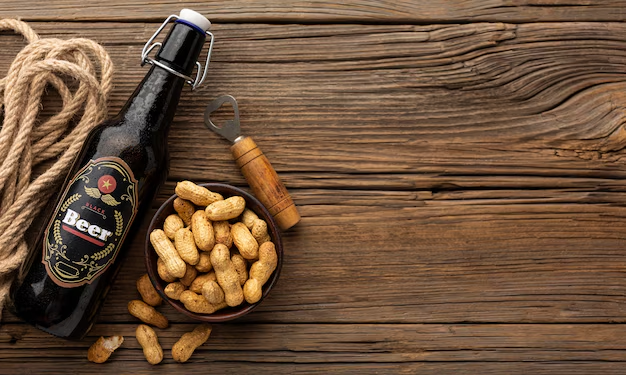How Long Does Beer Stay Fresh in the Fridge? Tips for Maximizing Shelf Life 🍻
The chill of a cold beer after a long day is a pleasure that many look forward to. But if you're a beer enthusiast, you might wonder how long your favorite brew remains at its peak quality while stored in the refrigerator. Let's explore the journey of beer from the shelf to the fridge and discover how to keep it fresh and flavorful.
Understanding Beer Shelf Life
Beer, like many consumables, does have a shelf life. But what exactly affects its longevity?
Factors Affecting Beer Freshness
- Type of Beer: Different beers have varying shelf lives. Light beers like lagers and pilsners tend to have shorter lifespans compared to stouts and porters.
- Alcohol Content: Beers with higher alcohol content generally last longer due to their preservative nature.
- Storage Conditions: Temperature and exposure to light play crucial roles. Ideally, keep beer in a dark, refrigerated place to prolong its freshness.
- Packaging: Cans protect beer from light and air better than bottles, which can lead to a longer shelf life.
Typical Refrigerator Lifespan
Generally, beers will remain fresh up to six months in the refrigerator. However, this is a general guideline and can vary based on the beer type and storage conditions.
Optimal Storage Practices for Beer
To ensure your beer stays as fresh as possible, proper storage is key.
Keep it Cool
Refrigeration is crucial for maintaining beer's freshness. The cold environment slows down the deterioration process that naturally occurs over time. Aim for a temperature of 34-38°F (1-3°C) for best results.
Store Upright
Keeping beer bottles or cans upright reduces the surface area exposed to oxygen, which helps prevent oxidation—a major cause of beer spoilage.
Avoid Light Exposure
Light can react with beer, causing off-flavors. To avoid this, store beer in a dark place. If your fridge has a glass door, consider using opaque containers.
Recognizing Signs of Spoiled Beer
Even with proper storage, beer can go bad. Here are some signs to watch for:
- Off Smell: If it smells like cardboard or wet paper, it's likely oxidized.
- Flat Flavor: Lack of carbonation or a dull taste might indicate it's past its prime.
- Cloudy Appearance: While some beers are naturally cloudy, sudden haze can signify spoilage.
Does Age Improve Beer?
For some beers, like certain craft brews, aging can enhance flavors. However, not all beers benefit from this process.
Beers That Age Well
- Barleywines
- Imperial Stouts
- Belgian Ales
These beers, often with higher alcohol content, can develop complex flavors over time.
When Not to Age
- IPAs and Lagers: These beers are best consumed fresh for optimal hop flavor and aroma.
Practical Tips for Beer Lovers 📝
Here’s a quick guide to ensure you’re storing your beer correctly:
- 🌡️ Tip 1: Keep beer refrigerated at a consistent temperature.
- 🥫 Tip 2: Prefer cans over bottles for longer storage.
- ⏳ Tip 3: Note the "best by" date, but remember it’s a guideline, not a deadline.
- 🔦 Tip 4: Minimize light exposure at all costs.
- 🆙 Tip 5: Store your beer bottles and cans upright.
The Role of Refrigeration in Beer Storage
Refrigeration not only maintains the freshness of beer but also enhances its flavors. Cold storage slows down the chemical reactions that can degrade beer quality.
Impact on Taste
Cold temperatures help in maintaining the crispness and carbonation in beer. This is particularly important for lagers and pilsners, which thrive on a clean, sharp taste profile.
FAQs About Beer Storage
1. Can beer go bad even if it’s unopened? Yes, unopened beer can still go stale over time, especially if not stored in ideal conditions.
2. How long can I store craft beer in the fridge? It depends on the type—lighter and hoppier craft beers are best enjoyed sooner, ideally within 3-6 months. Stronger varieties can last longer.
3. Is it okay to refrigerate beer, take it out, and then refrigerate again? While not ideal, it won’t necessarily spoil the beer, but repeated temperature changes can affect its flavor and carbonation.
Final Thoughts on Beer Storage
Storing your beer correctly ensures you enjoy it at its best quality. While beer does have a shelf life, with the right care, you can savor each sip as if it just rolled off the brewery line. Remember, the best practice is to enjoy your beer within its peak freshness window.
Quick Recap Table 🗒️
| Tip | Description | Emoji |
|---|---|---|
| Refrigerate | Store at 34-38°F for best results | 🌡️ |
| Can Over Bottle | Choose cans when possible | 🥫 |
| Mind the Date | Check "best by" dates but know they’re flexible | ⏳ |
| Avoid Light | Keep beer away from light exposure | 🔦 |
| Store Upright | Reduces oxygen exposure | 🆙 |
By implementing these storage practices, the next time you crack open a cold one, you'll experience beer in its most flavorful form. Enjoy responsibly! 🍻

